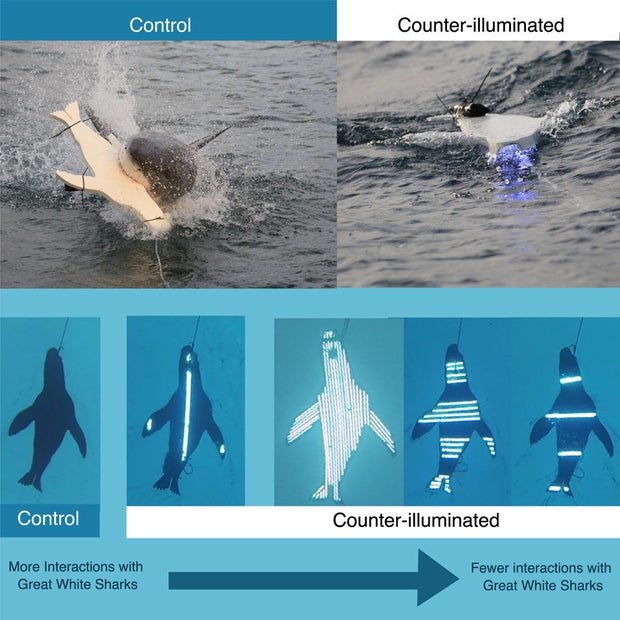Study finds great white sharks less likely to attack surfboards with bright lights: “Like an invisibility cloak”
Covering your surfboard in bright lights sounds like an open invitation to great white sharks, but research released Tuesday by Australian scientists found it might actually stave off attacks.
Biologist Laura Ryan said the predator often attacked its prey from underneath, occasionally mistaking a surfer’s silhouette for the outline of a seal.
Ryan and her fellow researchers showed that seal-shaped boards decked with bright horizontal lights were less likely to be attacked by great white sharks.
This appeared to be because the lights distorted the silhouette on the ocean’s surface, making it appear less appetizing.
“There is this longstanding fear of white sharks and part of that fear is that we don’t understand them that well,” said Ryan, from Australia’s Macquarie University.
The study, published in the journal Current Biology, was conducted in the waters of South Africa’s Mossel Bay, a popular great white feeding ground.
Seal-shaped decoys were strung with different configurations of LED lights and towed behind a boat to see which attracted the most attention.
Brighter lights were better at deterring sharks, the research found, while vertical lights were less effective than horizontal.
Macquarie University Professor Nathan Hart, one of the study’s authors, said the lights caused a “complex interaction” with the shark’s behavior.
“It’s like an invisibility cloak but with the exception that we are splitting the object, the visual silhouette, into smaller bits,” Hart said.
The study’s authors released a video showing some of the research in action.
Ryan said the results were better than expected and is now in the process of building prototypes for use on the underside of kayaks and surfboards.
Australia has some of the world’s most comprehensive shark management measures, including monitoring drones, shark nets and a tagging system that alerts authorities when a shark is near a crowded beach.
Ryan said her research could allow less invasive mitigation methods to be used.
More research was needed to see if bull and tiger sharks — which have different predatory behavior — responded to the lights in a similar way, the authors said.
Ryan et al. / Current Biology
There have been more than 1,200 shark incidents in Australia since 1791, of which 255 resulted in death, official data shows.
Great white sharks were responsible for 94 of those deaths.
The overall number of deadly shark attacks worldwide in 2023 remained relatively low, but it was still twice the previous year’s total, according to the latest iteration of the International Shark Attack File — a database of global shark attacks run by the University of Florida.
The report noted that a “disproportionate” amount of people died from shark bites in Australia last year compared with other countries around the world.






